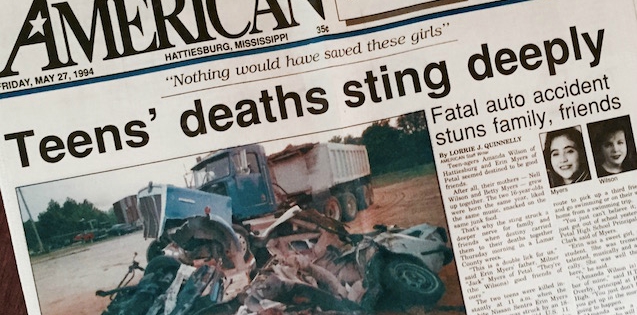I stopped talking to my friend Erin Myers because I was embarrassed of her.
We were going to the mall together, and she wore a sleeveless denim jacket and a hat decorated with a large sunflower. This was also the year she played trumpet in the band, a fact that significantly lowered her social status at Petal High. I was terrified of being seen with her.
And somehow Erin detected it. This particular afternoon when I asked her to stop at my mom’s work for just a minute, she let me out and drove off. I was confused and figured she must’ve misunderstood. We didn’t have cell phones back then, so I had to wait for a couple of hours before I called her. When she answered the phone, I asked what happened.
“If you’re ashamed to hang out with me, I don’t want you around me,” she said.
“Okay,” I said, and I hung up on her.
It was the easy-out I’d been looking for. Now I didn’t even have to feel guilty for not wanting to be friends — she was practically the one who cut it off. Phew.
One month later, Erin was driving with a friend and pulled in front of an 18-wheeler, dying on impact. The next day the newspaper published a photo of her in a band uniform with the headline “Teens’ deaths sting deeply.” I remember looking at the paper, trying to read it in a way that would mean Erin was still alive.
In the following months I did everything I could to resurrect Erin. I went through photos of her over and over again. I listened to her mix tapes. I became friends with her best friends.
Letting Go of Guilt
Guilt filled in the empty space she left. I’d rejected her in her last month, and I tried to exonerate myself by grieving as hard as possible. I needed to prove to myself I really loved her. I even believed if only we’d been on good terms she might’ve been with me and not had the wreck.
A year after Erin died, I was doing my math homework and began to think about her, but it bothered me when I didn’t get particularly emotional about it. Staying heartbroken was one of the ways I kept her alive, so I made myself get teary-eyed and cry a little bit.
“What’s going on?” my mom asked when she saw that my eyes were red.
“I’m just sad because I miss Erin.”
My mother, who was more sensitive about my loss than anyone, gently said something I didn’t expect: “Joshua, it’s okay to stop grieving.”
I wanted to feel offended, but instead I felt relieved. I needed permission to move forward, to walk away from my internal funeral and stop seeking absolution from Erin. My mom, the most authoritative person in my life at the time, gave me that. Guilt began to lose its grip, but fear did not.
The Tight Grip of Fear
In the years following Erin’s death, my mind became filled with morbid visions. If a group was running late and I couldn’t get in touch with them, they were dead. I consistently imagined others in worst-case scenarios. Murder, car accidents and plane crashes perpetually loomed over my loved ones. No one and nowhere was safe.
Fear kept me in control. It protected me from the unpredictable. It prepared me for the worst before the worst could get to me. Nobody’s death, no tragedy, no loss would catch me off guard again.
This went on for years, and it only got worse once I married and had kids. I then had new people to lose. My premonitions of death and despair became a daily habit, visions that raced through my mind dozens of times a day. I occasionally prayed that God would heal me, and I found relief in fits and starts. But one of the more meaningful breakthroughs happened just this week.
Learning to Let Go
As I was driving home from work thinking about Erin and the way her death affected me, the Holy Spirit reminded me of all the passages that tell us not to be afraid. Then, like my mother, God placed a thought in my heart I didn’t expect: Joshua, it’s okay to stop being afraid. This time, tears of gratitude welled up in my eyes.
The dominos started to fall as the truth emerged, one thought at a time. I don’t have to fear death. Jesus already took it to the grave forever. I don’t have to worry about what happens to me in the end. The end already happened when Jesus was resurrected and I was resurrected with Him.
I don’t have to wallow in guilt and fear anymore, and for God’s sake, I’m holding onto that. I’ve gained everything, and I have nothing to lose. Death is an open door into new life.
“[W]hen our dying bodies have been transformed into bodies that will never die, this Scripture will be fulfilled: ‘Death is swallowed up in victory. O death, where is your victory? O death, where is your sting?’” (1 Corinthians 15:54-55).
Copyright 2016 Joshua Rogers. All rights reserved.












